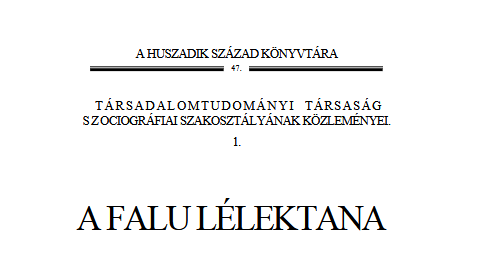In or shortly before 1913, the early sociologist Róbert Braun conducted fieldwork in the Romanian-inhabited village of Cicir on the side of the river Mureș east of Arad, a place he had known very well since childhood. The result was his study A falu lélektana ‘Psychology of the Village’, in which he recorded his observations and those of the village intelligentsia he interviewed in the form of answers to a questionnaire by Chicago sociologist William I. Thomas. Several of its points touch on the local peasantry’s political imaginary and ideas.
They are also very attuned to some more distant events. It is highly characteristic that, for example, there is not a single person in the village who does not know about the sinking of the Titanic or Vlaicu’s flight [Romanian aviator from Transylvania] – these were frequent topics of conversation during my stay there – but none of the people I asked knew about happenings in the Hungarian parliament, such as the Kovács assassination attempt. The Arad paper Poporul Român comes to the village in multiple copies and they could read about it there, but they are probably not interested in the parliament.
(…) they sing Hungarian melodies, sometimes even part of the lyrics (never German ones, although Germans live closer to the village than Magyars), and operetta melodies, which get to them either through the intermediary of the town or the military (…)
According to the notary: they are generally difficult to influence. Few people listen to the notary, who they resent because of the high taxes. (…)
In the old days, when transport was less frequent, a German passing through the village would be followed by half the village’s children, shouting jabs him, not out of hostility but treating him as some strange phenomenon, like a chimney sweep. Today this is no longer the custom. (…)
There is a wealthy and respectable man who came from the Banat 22 years ago and who, when it comes to holding office, is spoken of as a good man, a clever man, but a stranger (vinitură). (…)
Even if some people know the word state, few are even vaguely familiar with its meaning. They only know it in one capacity: as a landholder (cămăra). There are treasury lands on the other side of the Mureș River, which they regard as almost hostile territory. (…)
There is not a single person in the village who is not willing to sacrifice for their children to learn Hungarian, but there is hardly any way to do so. (…)
The priest: they believe that the outcome of the trial depends on who has the better lawyer to persuade the judge. The court is generally considered incorruptible, if only because it is “imperial” [császári/kaiserlich] (…)
What the size of the tax or levy depends on is something that very few people have a clue about.
– It’s probably the Arad gentlemen who are doing it, so that the tax is higher this year, someone told me in response to a question. (…)What is certain is that the brutality of the gendarmerie makes it one of the most hated institutions, and perhaps the only thing greater than this hatred is the fear of the gendarmes. There is less hatred and fear of the customs officers (they have guns, but they are not allowed to shoot, they think), but these are as far as possible outsmarted. (…)
In this district it typically comes down to a contest between a [Romanian] nationalist and a pro-government candidate; if money, drink and terror hold sway, the latter wins, if the election is relatively fair (there was one such case so far), a nationalist is elected. It is noticeable that public opinion sides with the nationalist candidate. This is not so much that they fully understand the nationalist programme, but because they are inspired by a candidate of the same descent who speaks to them in their mother tongue.
Tags: dynastic_loyalty, elections, gendarmes, language, taxes


